Congratulations to the first-ever finalists for Europe’s Ada Awards, recognizing top girls and women in digital fields, and the organisations that support them!
European 2013 Digital Woman of the Year™ Award Finalists:
 Sasha is founder of both the European Centre for Women and Technology and the Bulgarian Centre of Women in Technology, having launched the latter at end 2012. During her career as a global executive for Hewlett-Packard, Sasha succeeded in attracting key investment in the ICT sector in Bulgaria that resulted in thousands of new digital jobs. She is responsible for launching and actively contributing to a multitude of outreach activities that aim to inspire girls and women to pursue digital careers in Bulgaria and beyond.
Sasha is founder of both the European Centre for Women and Technology and the Bulgarian Centre of Women in Technology, having launched the latter at end 2012. During her career as a global executive for Hewlett-Packard, Sasha succeeded in attracting key investment in the ICT sector in Bulgaria that resulted in thousands of new digital jobs. She is responsible for launching and actively contributing to a multitude of outreach activities that aim to inspire girls and women to pursue digital careers in Bulgaria and beyond.
 Carrie Anne is leading change in the way computing is taught at schools across the UK through her work with the department for Education, the Raspberry Pi Foundation and computing at school. She is engaged in projects to inspire girls and other minority groups into computing and tackling teaching resources that currently disenfranchise young girls and women. For the second year in a row, Carrie Anne’s initiative Geek Gurl Diaries has been nominated for a digital heroes award. She is also writing a fun tech book for teenagers about Raspberry Pi to engage all regardless of gender.
Carrie Anne is leading change in the way computing is taught at schools across the UK through her work with the department for Education, the Raspberry Pi Foundation and computing at school. She is engaged in projects to inspire girls and other minority groups into computing and tackling teaching resources that currently disenfranchise young girls and women. For the second year in a row, Carrie Anne’s initiative Geek Gurl Diaries has been nominated for a digital heroes award. She is also writing a fun tech book for teenagers about Raspberry Pi to engage all regardless of gender.
 Geke is co-author of “Ronde vormen in IT” (Shapely Curves in IT), a book about the careers of women in ICT environments and the importance of the feminine touch. She is founder of “Female Ambassadors in ICT,” ForceFive, the first Dutch “Women in ICT” survey, and the CIAO Academy, a new Dutch education program that aims at streaming talented, career-aged women into creative roles aligning ICT and business.
Geke is co-author of “Ronde vormen in IT” (Shapely Curves in IT), a book about the careers of women in ICT environments and the importance of the feminine touch. She is founder of “Female Ambassadors in ICT,” ForceFive, the first Dutch “Women in ICT” survey, and the CIAO Academy, a new Dutch education program that aims at streaming talented, career-aged women into creative roles aligning ICT and business.
European 2013 Digital Girl of the Year™ Award Finalists:
 14-year-old Amy has been coding for three years and has inspired people of all ages with her keynote speeches at the Raspberry Jamboree, Campus Party EU and Wired: Next Generation. She teaches older pupils how to code during her school lunch breaks and with the Manchester Girl Geeks.
14-year-old Amy has been coding for three years and has inspired people of all ages with her keynote speeches at the Raspberry Jamboree, Campus Party EU and Wired: Next Generation. She teaches older pupils how to code during her school lunch breaks and with the Manchester Girl Geeks.
 Lune develops her own games and interactive movies with CoderDojo. She designs robots and dreams of becoming an engineer. At nine years of age, she is already a true digital visionary and has a track-record of getting girls her age excited about digital endeavor.
Lune develops her own games and interactive movies with CoderDojo. She designs robots and dreams of becoming an engineer. At nine years of age, she is already a true digital visionary and has a track-record of getting girls her age excited about digital endeavor.
 At 13, Olina Helga has taught both children and teachers the basics of programming. She has blogged for Little Miss Geek in the UK, been nominated to speak at TED and showcased as a keynote speaker at Iceland’s largest IT conferences. She especially enjoys seminars for girls that combine the basics in programming and building up self-confidence.
At 13, Olina Helga has taught both children and teachers the basics of programming. She has blogged for Little Miss Geek in the UK, been nominated to speak at TED and showcased as a keynote speaker at Iceland’s largest IT conferences. She especially enjoys seminars for girls that combine the basics in programming and building up self-confidence.
2013 European Digital Impact Organisation of the Year™ Finalists:
 The Berlin Geekettes are a community of women dedicated to helping aspiring and established female tech innovators. They believe that the more women get involved with tech design, development and leadership, the more successful and diverse our companies and products will be in the future.
The Berlin Geekettes are a community of women dedicated to helping aspiring and established female tech innovators. They believe that the more women get involved with tech design, development and leadership, the more successful and diverse our companies and products will be in the future.
 As part of its Inclusion & Diversity commitment, Cisco undertakes a range of activities around the world to support girls in making ICT relevant study choices. This includes the 2013 “Tech Needs Girls” campaign where Cisco sponsored a competition for school-age girls in Belgium to design a mobile application thus creating a great vehicle for introducing girls to ICT careers and ICT studies.
As part of its Inclusion & Diversity commitment, Cisco undertakes a range of activities around the world to support girls in making ICT relevant study choices. This includes the 2013 “Tech Needs Girls” campaign where Cisco sponsored a competition for school-age girls in Belgium to design a mobile application thus creating a great vehicle for introducing girls to ICT careers and ICT studies.
 The Hochschule für Technik und Wirtschaft is Berlin’s largest University of applied sciences. In 2009, HTW inaugurated an innovative women-only bachelor program, “Frauenstudiengang Informatik und Wirtschaft”, aimed at increasing leadership for women in technology. The program accepts forty applicants every year and celebrated its first graduating class in 2012.
The Hochschule für Technik und Wirtschaft is Berlin’s largest University of applied sciences. In 2009, HTW inaugurated an innovative women-only bachelor program, “Frauenstudiengang Informatik und Wirtschaft”, aimed at increasing leadership for women in technology. The program accepts forty applicants every year and celebrated its first graduating class in 2012.
Join us at ICT 2013 on 7 November in Vilnius, Lithuania where Ms. Neelie Kroes, European Commission Vice President responsible for the Digital Agenda, will announce the 2013 Digital Woman of the Year™, Digital Girl of the Year™ and Digital Impact Organisation of the Year™!
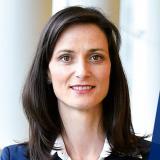
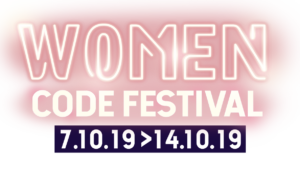

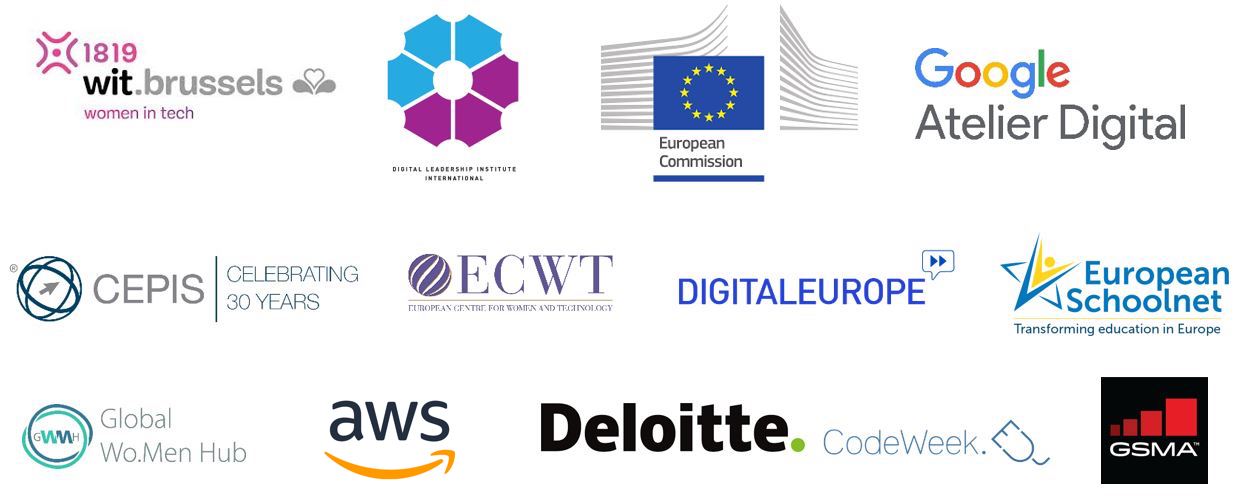





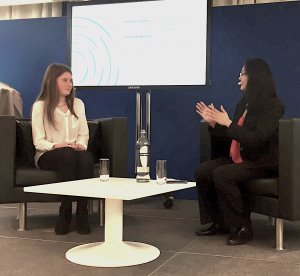
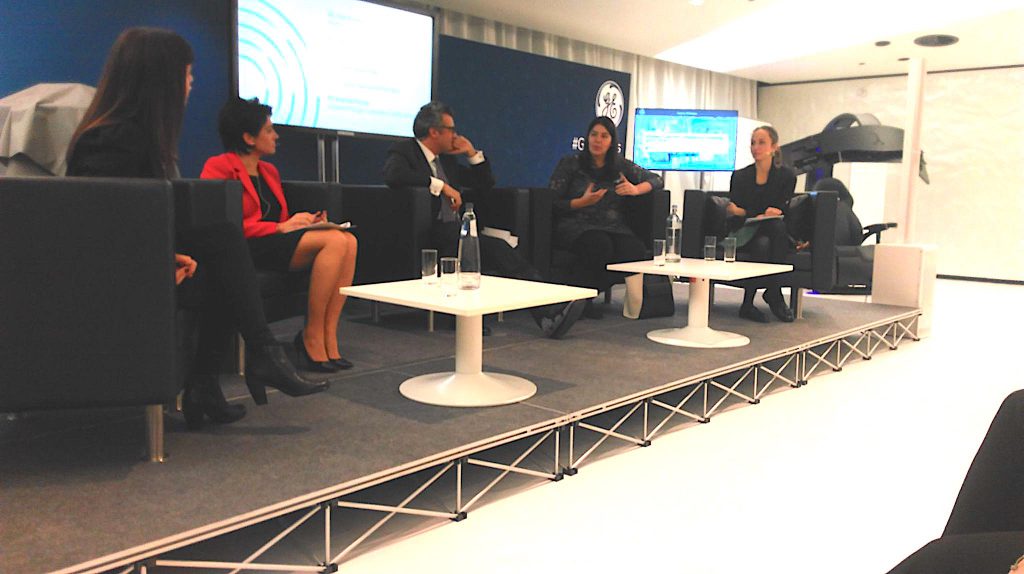
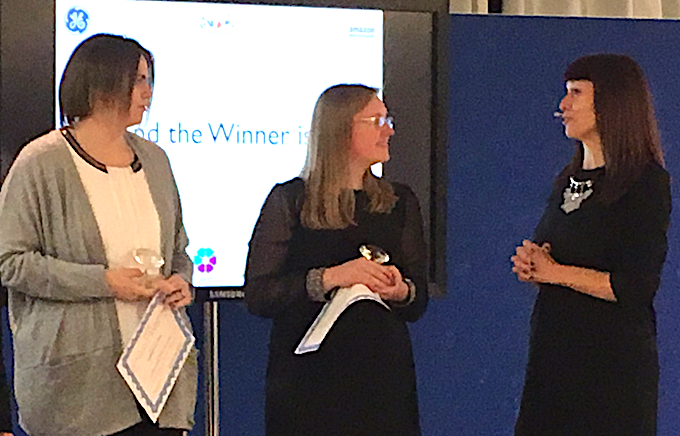

 Carrie Anne is leading change in the way computing is taught at schools across the UK through her work with the department for Education, the Raspberry Pi Foundation and computing at school. She is engaged in projects to inspire girls and other minority groups into computing and tackling teaching resources that currently disenfranchise young girls and women. For the second year in a row, Carrie Anne’s initiative Geek Gurl Diaries has been nominated for a digital heroes award. She is also writing a fun tech book for teenagers about Raspberry Pi to engage all regardless of gender.
Carrie Anne is leading change in the way computing is taught at schools across the UK through her work with the department for Education, the Raspberry Pi Foundation and computing at school. She is engaged in projects to inspire girls and other minority groups into computing and tackling teaching resources that currently disenfranchise young girls and women. For the second year in a row, Carrie Anne’s initiative Geek Gurl Diaries has been nominated for a digital heroes award. She is also writing a fun tech book for teenagers about Raspberry Pi to engage all regardless of gender.
 14-year-old Amy has been coding for three years and has inspired people of all ages with her keynote speeches at the Raspberry Jamboree, Campus Party EU and Wired: Next Generation. She teaches older pupils how to code during her school lunch breaks and with the Manchester Girl Geeks.
14-year-old Amy has been coding for three years and has inspired people of all ages with her keynote speeches at the Raspberry Jamboree, Campus Party EU and Wired: Next Generation. She teaches older pupils how to code during her school lunch breaks and with the Manchester Girl Geeks. Lune develops her own games and interactive movies with
Lune develops her own games and interactive movies with  At 13, Olina Helga has taught both children and teachers the basics of programming. She has blogged for Little Miss Geek in the UK, been nominated to speak at TED and showcased as a keynote speaker at Iceland’s largest IT conferences. She especially enjoys seminars for girls that combine the basics in programming and building up self-confidence.
At 13, Olina Helga has taught both children and teachers the basics of programming. She has blogged for Little Miss Geek in the UK, been nominated to speak at TED and showcased as a keynote speaker at Iceland’s largest IT conferences. She especially enjoys seminars for girls that combine the basics in programming and building up self-confidence.


